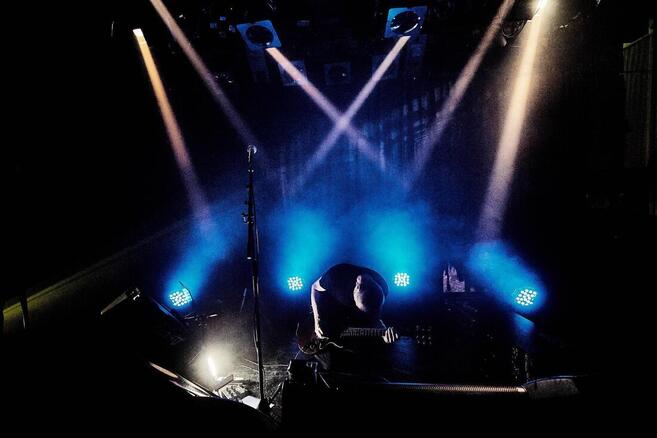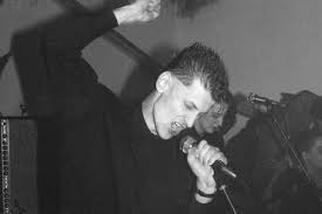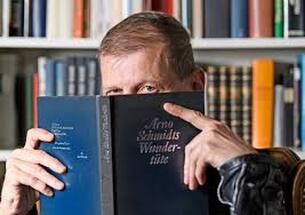Menu
|
His numbers on Spotify are very modest. When I talk to Andrea Kaiser, who is just Kaiser to most people, I tell him that he has ten monthly listeners on Spotify (and one of them is me). That’s awesome, Kaiser replies, I’d love to send everyone of them a bouquet of flowers. Catering to the masses has never been Kaiser’s goal when making music. In fact he would change his musical style immediately should this style ever become mainstream and enjoy commercial success. In October of 2019, one month after the release of his latest album Songs of No Return, this is not a particular risk. Kaiser is the founder and at present the only member of Dnepr, a band that started its career deep down in Bern’s underground music scene of the 1980ies and has not moved up considerably since then. (And yes, there used to be an underground scene in Switzerland.) Do you still talk about the 1980ies?, I ask Kaiser. Sure, he says, when I’m asked. Kaiser’s memories of the starting years of his career are still very much vivid. Between 1987 and 1995 he had released a bunch of six records and he still remembers every detail about each of these songs. Dnepr combined Kaiser’s heavy guitar - sometimes rhythmic, sometimes gloomy and plaintive - with elements from post punk, prog rock and new wave. The intention was always to be provocative, with a distinct nihilistic attitude, and play with political buzzwords in a period when the cold war was still fully on. Dnepr is a great motorbike brand from Ukraine, Kaiser tells me, and I wanted a name for my band with an eastern, communist touch. Dnepr’s first album was called Hymn of Nihilon and it was inspired by Alan Sillitoe’s novel “Travels in Nihilon” where a group of people is sent to the country of Nihilon to collect information for a new travel guide. In Nihilon honesty is outlawed, drunk driving is mandatory and nihilism reigns supreme. TV and radio news are announced with “Here are the lies!”. These are just the kind of subversive ideas that Kaiser loves. All of Dnepr’s albums were recorded in Nihilitz Studios at Ulaanbaatar; Nihilitz being the drink that Nihilon’s citizens usually drink and Ulaanbaatar the capital of Mongolia, a former hidden treasure of a communist-ruled country. In reality Kaiser’s studio is just a small room in the basement of his apartment in Bern, just big enough for him and his guitar. Kaiser has never traveled to Ulaanbaatar. While Dnepr’s music is purely instrumental now, there were lyrics in the first period of Dnepr. Have you lost your inspiration for words?, I ask Kaiser. Not at all, he replies, I never had troubles expressing myself. It’s just that I find it more challenging these days, but also more of a thrill, to produce music without lyrics. With lyrics, you can repeat them over and over again and you have a song. Without lyrics, your compositions need to be constructed differently in order to keep the song going and the audience listening. Dnepr has always been avant-garde. For “Figures in a Landscape” from Hellhome, Dnepr’s 1993 release, a computer generated voice spoke words that had been fed to the computer by Kaiser (by profession, Kaiser is a software engineer). “Deus Ex Machina” and “The Nile Song” (both from Vandalism, 1991) are similar adventures in sound. Other songs on Vandalism - “The definitive Birth, the ultimate Life and the absolute Death”, as well as “Come back (I want to kick into your ass)”- definitely excel through their innovative titles, one profound and one more than subtly funny. By comparison, The Empire Strikes Back from 1990 is a rather conventional album, with music that can be qualified as industrial heavy metal based on piercing guitar riffs. What did stop you from becoming as big as Metallica?, I ask Kaiser, because you certainly had the talent. Well, I don’t know, says Kaiser, always the humble man. It also has to do with luck. You need to be young to start such a career, to make it big. Music consumers today are kids and teenagers. They need to be able to identify with you. If you are 30 plus, that’s almost impossible. Add to this Kaiser’s eternal refusal to compromise on his music and you know why Dnepr is not a household name in the charts. Fast forward 23 years to the beginning of 2018. The world has not heard a lot from Dnepr, or Kaiser, since 1995, certainly not in the form of an album. What happened, Kaiser? Kaiser doesn’t want to talk about these years of near retirement, except in private mode. But then, slowly slowly, he crawled back to life and music and reactivated Nihilitz Studios. Songs of No Return is promoted as your comeback album, I mention to Kaiser, but actually you have already released The Nine Gates two years ago. I am happy that you make me talk about it, he replies, so for the first time I get to explain what is the story behind the nine gates. "Maybe I am infected by a software virus that damages my operating system." The first connotation with this album title are the nine gates that lead to hell, Kaiser illuminates me. But I also see this as the nine month of pregnancy and thus you arrive at an equation life = hell. Most people find life quite ok, because they have a mechanism built in that helps them to suppress any fear or doubt they may have. Without this mechanism, we couldn’t exist. For myself, this mechanism is slowly wearing off, maybe because I am infected by a software virus that damages my operating system. George Orwell helped me to see that I am not alone in this: “any life when viewed from the inside is simply a series of defeats”. How come The Nine Gates has twelve tracks? The three extra tracks are the afterbirth. It happens quite often. I have a concept, I write tracks, and when I’m done, more stuff needs to get out. With Song of No Return, Dnepr and Kaiser are really back. The album consists of twelve songs that Kaiser wrote and recorded all by himself. I am inspired to work alone at the moment, says Kaiser, it’s efficient, no discussions, you don’t have to convince anyone. Would you consider yourself a loner, a bit of an oddball?, I challenge Kaiser. Yes, he says, to a certain extent. However I am not antisocial. The Open Enso Talks: one hour with Kaiser a/k/a Dnepr (language: Swiss German) The new Dnepr album is literature turned into music. Kaiser likes to read - long, difficult reads, mostly from dead authors - and he knows his books well. “Zettels Traum” is inspired by the monumental work of the same title by Arno Schmidt (my song is not a musical abstract of the book; it’s the soundtrack of a dream with breaks and surprising twists, Kaiser says); “Venaska” is a main character in Alfred Döblin’s utopian novel “Berge, Meere und Giganten”, polygamous and bisexual (the book is about contrasts. It’s a dystopia with a woman, a goddess of love, who is called Venaska. I tried to compose a song that is oscillating between the ugly and the beautiful).
Kaiser is a nerd for sound. At any time of the day he may feel inspired to go down to the basement, in his studio, and work on a track. All night long, if needed. Once he dreamt of a counterpart to a leitmotiv he had composed earlier. When he woke up, he immediately ran downstairs, naked as he was, strapped on his guitar and recorded the idea. Are you nerdy with guitars as well?, I ask Kaiser. I am not a collector, he says, I only own two guitars (two handmade Gordon Smith guitars, made in UK). In the end it’s the effect pedals and the amplifiers that create the sound. If I go to a concert and the guitarist hauls a rack with five guitars onto the stage, I know that I am in the wrong place. Dnepr have never played a lot of concerts, not even in their primetime in the 1980ies and 1990ies. In 2018 Kaiser played one set in the knight’s hall of an old castle near Bern. This year, there were the album launch in September and another gig in November. And that’s it. I like to play loud, Kaiser explains, really loud. Preferably at 120 decibels. In most places that’s not possible. But I can’t trim down. Playing my music at 93 decibels? Even whistling is louder! Already Kaiser has ideas for a next album. Is he recording? Not yet, he says. I am all about re-inventing myself. But when I start something new, I find my old music crappy. I am not yet ready to ditch Songs of No Return. That’s why I stick with it for the time being. I don’t even remember how I came up with the last question for Kaiser, but I must have been touched by something when listening to Dnepr’s albums: does he believe in love? Despite of his wary attitude towards society and his reluctance to comply with the masses, despite of all the utopian landscapes and the dystopian soundscapes that he creates: everything in Kaiser’s music is love. It’s a love that he gives and a love that he yearns to receive, forever carried and supported by the big waves of hope - hope for humankind, hope for a more human society - emanating from the strings of his guitar in Nihilitz Studios at Ulaanbaatar. It is because of love why we are on this planet, Kaiser answers. Without love we wouldn’t do anything, without love we wouldn’t make music. We would simply squat on the ground and pick our noses. Dnepr will perform at Les Amis/Wohnzimmer in Bern, Switzerland, on November 14, 2019. Be there (and have your earplugs handy)!
0 Comments
Leave a Reply. |
EditorKurt is based in Bern and Beirut is his second home. Always looking for that special angle, he digs deep into people, their stories and creations, with a sweet spot for music. Archives
September 2020
Categories
All
I'd love to discover you. Share your creations here.
|




 RSS Feed
RSS Feed
